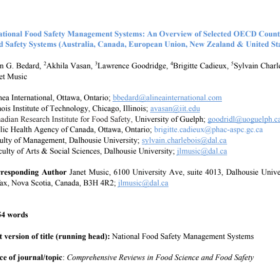National Food Safety Management Systems: An Overview of Selected OECD Country Food Safety Systems
05/05/2023
DOCUMENT DESCRIPTION
The purpose of this study is to understand global best practices of modern national food safety systems, with reference to selected Organisation for Economic Co-operation and Development (OECD) countries. This information can inform regulators and managers key stakeholders and donors for the design and development of capacity building of an effective national food control system aligned with international standards. Such systems require a comprehensive, integrated organization of infrastructure, policy and human resources to mitigate and control the evolving complexity of food safety risks. International experiences indicate that establishing risk-based preventive controls and verifiable management systems during primary production, processing and distribution of food proved to be more effective than inspecting possible contamination in final food products along the production chain (end-product testing). The development of an effective national food safety control system requires a comprehensive, integrated and rational organization of regulatory policy, infrastructure and human resources to mitigate and control the complexity of food safety risk. These include border inspection posts, laboratories, information systems and operational resources for monitoring, inspection, surveillance, incident management, traceability and stakeholder engagement for shared responsibility. This report provides a review of the existing risk-based food safety regulatory systems in selected OECD countries and focuses on their systems and approaches for enforcing food safety compliance along the entire food value chain.


